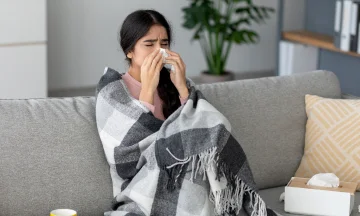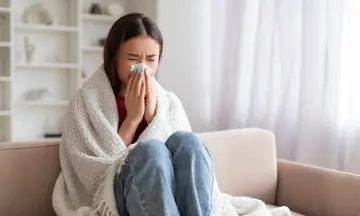
Monsoon is here and it usually keeps most people under the weather. With the Coronavirus pandemic raging at present, the situation is even harder. Certain common symptoms have made the condition worst with people getting confused between whether they have contracted Covid-19 or are suffering from other vector-borne and water-borne monsoon special ailments. Monsoons generally are the most fertile breeding season for harmful viruses, bacteria and other microorganisms. Thus, the risk of getting exposed to multiple viruses, bacteria and other infections is way more during the monsoons than any other season. Here is all about the most common monsoon diseases, the signs one must watch out for and the preventive measures that can help one keep these ailments at bay while tackling a pandemic.
Common monsoon diseases one must be aware of
During monsoons, the most common diseases have four mediums of transmission including mosquitoes, water, air and contaminated food. The mosquito-borne ailments like Malaria, Chikungunya and Malaria are the most prevailing conditions of the Monsoons. Frequently occurring water-borne diseases include Typhoid, Cholera, Leptospirosis, Jaundice, Gastro-intestinal infections and Hepatitis A. Monsoon also bring in a large number of air-borne infections that are spread through pathogens or disease-causing viruses like cold and flu and Influenza. Interestingly, most of these diseases share some of the common symptoms with Coronavirus which is why it is essential for one to be able to differentiate between the signs and take appropriate measures to stay fit during the Monsoons amid Coronavirus.
Mosquito-borne diseases
Mosquito-borne diseases are the most common ailments of the Monsoon. Malaria happens to be one of the major health concerns in India. It is caused by a single-celled parasite, Plasmodium and is hosted by the mosquito Anopheles minimus. This ailment is accompanied by high fever up to 105 degrees for several days.
Caused by Aedes Aegypti mosquito that breeds in stagnant water, the incubation period of Dengue is four to seven days after being bitten. The first symptoms of Dengue fever include fever and fatigue. Chikungunya is caused by Aedes albopictus mosquito and presents distinct arthritis symptoms like pain in the joints and bones and stiffness. High fever, chills and body aches are common symptoms of all three.
Steps to prevent mosquito-borne diseases
-
Make use of mosquito nets at home.
-
Do not allow water to stagnate or collect anywhere in and around the house.
-
Maintain adequate bathroom hygiene and keep it clean.
-
Make use of mosquito repellants/creams when you step out of the house.
Water-borne diseases
Water-borne diseases generally show up during the Monsoons affecting the children mostly. Caused by S. Typhi bacteria, Typhoid gets transmitted due to poor sanitation. Uncovered or spoilt food and drinking contaminated water are mostly responsible for Typhoid. Fever, headache, joint pain and sore throat are its common signs. Cholera too is caused due to poor sanitisation and having contaminated food and is accompanied by diarrhoea or loose motions.
Leptospirosis, also called Weil's Syndrome occurs when one comes in contact with dirty water or muck or mud water. It can be contracted through bruises, cuts, open wounds. Shivers, muscle pain, and headaches are general signs of Leptospirosis. Like Cholera and Typhoid, Jaundice too is caused due to poor sanitisation or consuming contaminated food and water. Jaundice results in liver dysfunction and the symptoms include weakness, fatigue, yellow urine, yellowing of eyes and vomiting.
Gastrointestinal infections include vomiting, diarrhoea and gastroenteritis. Having stale, uncovered, or contaminated food and water cause such infections. Hepatitis A is another common viral infection of the Monsoons that gets transmitted through contaminated food and water. It inflames and damages the liver and has symptoms like fatigue, fever, tenderness in the stomach, yellow eyes, dark-coloured urine and sudden loss of appetite.
Steps of prevention
-
Boil water and thoroughly wash fruits and vegetables before consumption.
-
Keep food covered and do not eat food from outside.
-
Maintain personal hygiene all the time. Wash your hands or use a hand sanitiser.
-
Get your children vaccinated if they are not already.
Air-borne diseases
Air-borne diseases spread through pathogens in the air causing common flu, viral fever, cold, cough and sore throat, mostly affecting senior citizens and children and those with weaker immunity. Cold and flu are the most common viral infection that occurs due to sudden temperature fluctuation during monsoon. It is accompanied by a runny nose, watery eyes, fever, chills and sore throat. Influenza is another common Monsoon disease, also known as seasonal flu. It is easily contracted and can be transmitted through the air.
Steps to prevent air-borne diseases
-
Cover mouth and nose while coughing and sneezing
-
Take warm water every few hours and carry a bottle of warm water in case you have to step out.
-
Maintain distance from those who are already infected and wash hands and feet when you step inside.
-
Live in well-ventilated homes.
Some tips from the doctor's desk to have healthy Monsoon
-
Be hydrated all the times, drink only boiled water and do not drink anything from outside
-
Maintain strict personal hygiene to avoid fungal infection
-
Wear full-sleeved and light clothes
-
Focus on having a diet enhancing immunity
-
Eat freshly washed, boiled vegetables, try to stay away from fats, oils and sodium and limit dairy intake.













